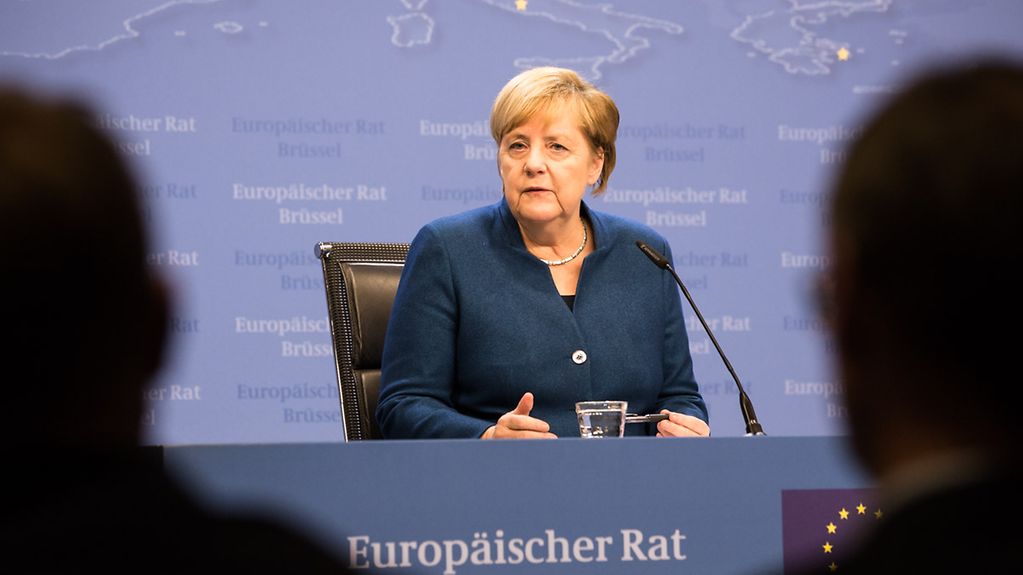European Council
The European Council has approved the Brexit agreement hammered out between the European Union and the United Kingdom. The heads of state and government did not manage to agree to begin accession talks with North Macedonia and Albania, however. Chancellor Angela Merkel said she much regretted this.

Speaking in Brussels, Chancellor Angela Merkel reported that North Macedonia and Albania have achieved a great deal and made progress.
Photo: Bundesregierung/Steins
Following the first day of the summit, Chancellor Angela Merkel said that the approval of the Brexit agreement was good news. It opens the chance "to retain good, close relations with the United Kingdom in future, both in economic terms and in the foreign and security policy field".
Preserving the single market, upholding the Good Friday Agreement
The European Commission President Jean-Claude Juncker and the British Prime Minister Boris Johnson announced that agreement had been reached on the withdrawal agreement shortly before the European Council met in Brussels. The announcement was unanimously welcomed by the heads of state and government of the European Union.
The Chancellor stressed that essential preconditions would be met. The integrity of the EU’s single market would be ensured, and border checks between Northern Ireland and the Republic of Ireland avoided; while the Good Friday Agreement would be upheld.
Free trade agreement must be negotiated
Now the deal must be approved by the European Parliament and the House of Commons in London, before it can come into effect. There will then be a transitionary period up to the end of 2020, in which a free trade agreement can be negotiated, said Angela Merkel. "Now it is absolutely clear that the United Kingdom will be a third country, and that a free trade agreement of this sort must be negotiated very swiftly with this third state."
Angela Merkel said that it was not a happy day, because a member state would be leaving the EU. But Germany has always endeavoured to ensure an orderly withdrawal of the UK. "And today we are one important step closer to achieving this goal," said the Chancellor.
No agreement on North Macedonia and Albania
The heads of state and government were unable to agree to begin accession negotiations with North Macedonia and Albania. Chancellor Angela Merkel declared that she very much regrets this. "It proved impossible to overcome the differences of opinion." But the Council will continue to work on the matter. Before the Balkan Summit during Croatia’s Presidency, the matter is to be put on the agenda again.
In both countries a great deal has been achieved and progress has been made. North Macedonia has changed its name to make the accession process possible. In these countries there will now, the Chancellor pointed out, "naturally be disappointment". Europe must be predictable and reliable.
Other items on the agenda
At the summit in Brussels, the heads of state and government of the EU also discussed the following issues:
- Relations with Turkey: The European Council also spoke about Turkey’s military operation in northern Syria. Here it must be seen if the recently agreed ceasefire can actually resolve the conflict, said the Chancellor. At the same time she stressed that Turkey is "doing a remarkable job" with regard to the 3.6 million Syrian refugees it has taken in. The EU will continue to provide financial support in this respect, she declared.
- Multiannual financial framework: The financing of the EU budget and the individual policy areas for the period 2021 to 2027 was also discussed. The German government is working to ensure that burdens are shared fairly here. The heads of state and government are, however, "still far from" an agreement, reported Angela Merkel. There is time pressure and agreement should be achieved if at all possible under Croatia’s Presidency.
- Climate action was also discussed on the basis of the United Nations Climate Action Summit and with a view to the UN Climate Change Conference to be held in Santiago de Chile in December.
- The heads of state and government met with the designated President of the European Commission, Ursula von der Leyen, to explore her priorities and the way she envisages implementing the strategic agenda of the European Council. After the meeting the Chancellor reported there had been "great approval".
- Christine Lagarde was formally appointed President of the European Central Bank. As of 1 November, she will take over from Mario Draghi.